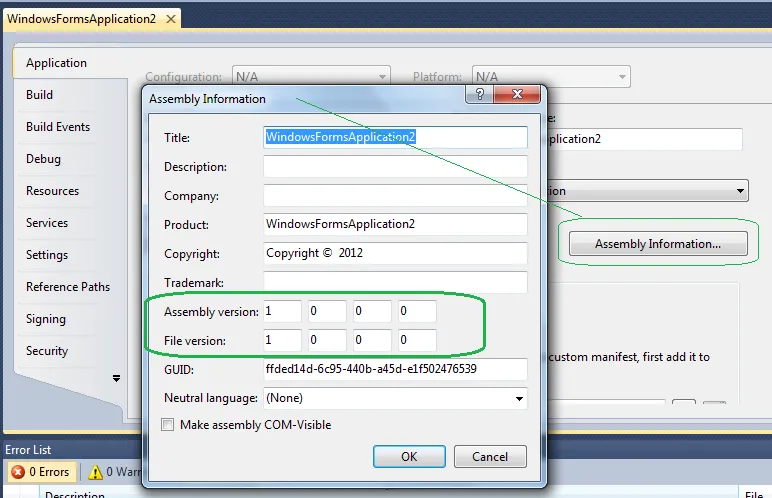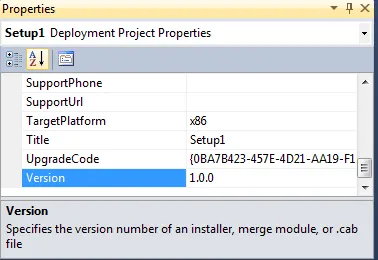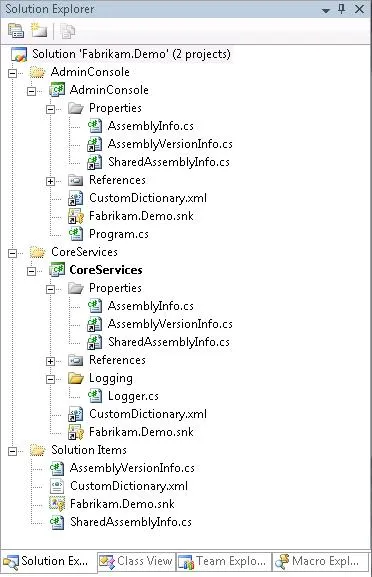我想在Visual Studio中更改我的安装程序版本属性,并在构建后,使所有项目版本从此属性更新,这可能吗?
使用MSI安装程序版本设置程序集信息版本号
我想在Visual Studio中更改我的安装程序版本属性,并在构建后,使所有项目版本从此属性更新,这可能吗?
5
项目有程序集和文件版本号:(不是安装版本,我已经相应地编辑了您的问题)

答案1:
如果您想使安装程序的版本号设置为程序集和文件版本号,则需要使用脚本/ exe来触发构建。

从我的研究来看,在PreBuildEvent中无法使用SetupVersion。它没有$SetupVersion命令: http://msdn.microsoft.com/en-us/library/42x5kfw4(v=vs.80).aspx 每次构建都需要更改PreBuildEvent,如Code Project文章中此评论所示,使用
-set:命令并不理想。我们需要的解决方案是一个PreBuildEvent调用AssemblyInfoUtil.exe并从vdproj项目文件中读取“ProductVersion”,然后更新程序集版本号。
我已经修改了这篇文章的代码,来展示如何从Setup.vdproj中读取产品版本,并且可以通过PreBuildEvent调用:
AssemblyInfoUtil.exe -setup:"C:\Program Files\MyProject1\Setup1\Setup1.vdproj" -ass:"C:\Program Files\MyProject1\AssemblyInfo.cs"
这是修改后的代码:
using System;
using System.IO;
using System.Text;
namespace AssemblyInfoUtil
{
class AssemblyInfoUtil
{
private static int incParamNum = 0;
private static string fileName = "";
private static string setupfileName = "";
private static string versionStr = null;
private static bool isVB = false;
[STAThread]
static void Main(string[] args)
{
for (int i = 0; i < args.Length; i++) {
if (args[i].StartsWith("-setup:")) {
string s = args[i].Substring("-setup:".Length);
setupfileName = int.Parse(s);
}
else if (args[i].StartsWith("-ass:")) {
fileName = args[i].Substring("-ass:".Length);
}
}
//Jeremy Thompson showing how to detect "ProductVersion" = "8:1.0.0" in vdproj
string setupproj = System.IO.File.ReadAllText(setupfileName);
int startPosOfProductVersion = setupproj.IndexOf("\"ProductVersion\" = \"") +20;
int endPosOfProductVersion = setupproj.IndexOf(Environment.NewLine, startPosOfProductVersion) - startPosOfProductVersion;
string versionStr = setupproj.Substring(startPosOfProductVersion, endPosOfProductVersion);
versionStr = versionStr.Replace("\"", string.Empty).Replace("8:",string.Empty);
if (Path.GetExtension(fileName).ToLower() == ".vb")
isVB = true;
if (fileName == "") {
System.Console.WriteLine("Usage: AssemblyInfoUtil
<path to :Setup.vdproj file> and <path to AssemblyInfo.cs or AssemblyInfo.vb file> [options]");
System.Console.WriteLine("Options: ");
System.Console.WriteLine(" -setup:Setup.vdproj file path");
System.Console.WriteLine(" -ass:Assembly file path");
return;
}
if (!File.Exists(fileName)) {
System.Console.WriteLine
("Error: Can not find file \"" + fileName + "\"");
return;
}
System.Console.Write("Processing \"" + fileName + "\"...");
StreamReader reader = new StreamReader(fileName);
StreamWriter writer = new StreamWriter(fileName + ".out");
String line;
while ((line = reader.ReadLine()) != null) {
line = ProcessLine(line);
writer.WriteLine(line);
}
reader.Close();
writer.Close();
File.Delete(fileName);
File.Move(fileName + ".out", fileName);
System.Console.WriteLine("Done!");
}
private static string ProcessLine(string line) {
if (isVB) {
line = ProcessLinePart(line, "<Assembly: AssemblyVersion(\"");
line = ProcessLinePart(line, "<Assembly: AssemblyFileVersion(\"");
}
else {
line = ProcessLinePart(line, "[assembly: AssemblyVersion(\"");
line = ProcessLinePart(line, "[assembly: AssemblyFileVersion(\"");
}
return line;
}
private static string ProcessLinePart(string line, string part) {
int spos = line.IndexOf(part);
if (spos >= 0) {
spos += part.Length;
int epos = line.IndexOf('"', spos);
string oldVersion = line.Substring(spos, epos - spos);
string newVersion = "";
bool performChange = false;
if (incParamNum > 0) {
string[] nums = oldVersion.Split('.');
if (nums.Length >= incParamNum && nums[incParamNum - 1] != "*") {
Int64 val = Int64.Parse(nums[incParamNum - 1]);
val++;
nums[incParamNum - 1] = val.ToString();
newVersion = nums[0];
for (int i = 1; i < nums.Length; i++) {
newVersion += "." + nums[i];
}
performChange = true;
}
}
else if (versionStr != null) {
newVersion = versionStr;
performChange = true;
}
if (performChange) {
StringBuilder str = new StringBuilder(line);
str.Remove(spos, epos - spos);
str.Insert(spos, newVersion);
line = str.ToString();
}
}
return line;
}
}
}
答案2:
在我看来,更好的方法是使用Shared Assembly Info类而不是单独的AssemblyInfo类文件。
要实现这一点,在解决方案文件夹中创建一个名为SharedAssemblyInfo.cs的文件,然后在每个项目中添加一个到SharedAssemblyInfo.cs的链接。您还可以将链接的SharedAssemblyInfo.cs移动到Properties文件夹中,以便它与解决方案中每个项目特定的AssemblyInfo.cs并排放置,如下所示。

using System;
using System.Reflection;
using System.Runtime.CompilerServices;
using System.Runtime.InteropServices;
// General Information about an assembly is controlled through the following
// set of attributes. Change these attribute values to modify the information
// associated with an assembly.
[assembly: AssemblyCompany("Saint Bart Technologies")]
[assembly: AssemblyProduct("Demo")]
[assembly: AssemblyCopyright("Copyright ? Saint Bart 2013")]
[assembly: AssemblyTrademark("")]
// Make it easy to distinguish Debug and Release (i.e. Retail) builds;
// for example, through the file properties window.
#if DEBUG
[assembly: AssemblyConfiguration("Debug")]
[assembly: AssemblyDescription("Flavor=Debug")] // a.k.a. "Comments"
#else
[assembly: AssemblyConfiguration("Retail")]
[assembly: AssemblyDescription("Flavor=Retail")] // a.k.a. "Comments"
#endif
[assembly: CLSCompliant(true)]
// Setting ComVisible to false makes the types in this assembly not visible
// to COM components. If you need to access a type in this assembly from
// COM, set the ComVisible attribute to true on that type.
[assembly: ComVisible(false)]
// Note that the assembly version does not get incremented for every build
// to avoid problems with assembly binding (or requiring a policy or
// <bindingRedirect> in the config file).
//
// The AssemblyFileVersionAttribute is incremented with every build in order
// to distinguish one build from another. AssemblyFileVersion is specified
// in AssemblyVersionInfo.cs so that it can be easily incremented by the
// automated build process.
[assembly: AssemblyVersion("1.0.0.0")]
// By default, the "Product version" shown in the file properties window is
// the same as the value specified for AssemblyFileVersionAttribute.
// Set AssemblyInformationalVersionAttribute to be the same as
// AssemblyVersionAttribute so that the "Product version" in the file
// properties window matches the version displayed in the GAC shell extension.
[assembly: AssemblyInformationalVersion("1.0.0.0")] // a.k.a. "Product version"
以下是一个AssemblyInfo.cs文件的示例:
// Note: Shared assembly information is specified in SharedAssemblyInfo.cs
using System.Reflection;
using System.Runtime.CompilerServices;
using System.Runtime.InteropServices;
// General Information about an assembly is controlled through the following
// set of attributes. Change these attribute values to modify the information
// associated with an assembly.
[assembly: AssemblyTitle("WindowsFormsApplication2")]
// The following GUID is for the ID of the typelib if this project is exposed to COM
[assembly: Guid("ffded14d-6c95-440b-a45d-e1f502476539")]
每次想要更改所有项目的程序集信息时,您可以在一个地方完成。我假设您希望将MSI设置版本设置为程序集版本号,这需要手动操作一次。
答案 3:
考虑切换使用MSBuild,它具有所有这些好处,但我不确定你现在是否有时间学习。
答案4:
使用以下星号语法,AssemblyInfo.cs中的程序集可以自动递增其构建号码:
[assembly: AssemblyVersion("1.0.0.*")]
这是一个好方法,因为跟踪构建号的目的是能够识别不同的构建版本。在预构建更改构建号会破坏此目的,因为构建尚未发生。
答案5:
这里的另一个CodeProject答案假设您想要在设置MSI项目文件中更新ProductVersion、ProductCode、PackageCode。我没有这样解释你的问题,根据这个线程,有问题:
pre-build event to change setup project's ProductVersion doesn't take effect until after the build
答案6(新):
以下是相关的 TFS Build 插件用于设置 "Assembly Info":https://marketplace.visualstudio.com/items?itemName=bleddynrichards.Assembly-Info-Task https://marketplace.visualstudio.com/items?itemName=bool.update-assembly-info https://marketplace.visualstudio.com/items?itemName=ggarbuglia.setassemblyversion-task。请注意,不要删除 HTML 标签。6
AssemblyInfo.cs)。 - Ian我不知道这是否完美地解决了你的问题,但是你可以实现一个包含所有配置管理信息的公共类,例如:
public class VersionInfo{
public const string cProductVersion = "1.0.0"
//other version info
}
在你使用新的类之后,你可以更新所有的AssemblyInfo.cs:
[assembly: AssemblyVersion(VersionInfo.cProductVersion)]
我希望这可以帮到你。
2
原文链接